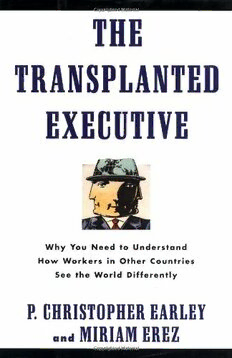Download The Transplanted Executive: Why You Need to Understand How Workers in Other Countries See the World Differently PDF Free - Full Version
Download The Transplanted Executive: Why You Need to Understand How Workers in Other Countries See the World Differently by P. Christopher Earley, Miriam Erez in PDF format completely FREE. No registration required, no payment needed. Get instant access to this valuable resource on PDFdrive.to!
About The Transplanted Executive: Why You Need to Understand How Workers in Other Countries See the World Differently
With the passage of NAFTA and GATT, the steady integration of the European Community, and the emergence of promising new markets in Eastern Europe and the Pacific Rim, businesses around the world are globalizing their operations with unprecedented speed. But as executives working in foreign countries have discovered, organizational cultures can differ dramatically from country to country, and management practices effective back home can fail miserably abroad. The Transplanted Executive provides a comprehensive resource for managers of any nationality striving to understand the diversity of workplace values and traditions--and how they can be used to maximize employee efficiency, morale, and the bottom line. Offering sensible solutions to everyday problems, this informative volume shows how employees with different cultural, religious, and ethnic backgrounds respond to specific managerial techniques. The authors demonstrate, for example, why effective incentive systems in Japan might decrease productivity in United States, and why successful efforts to create team-based cooperation in Russia could alienate rather than motivate workers in England. Each chapter focuses on a different management problem--effective communication, motivation of workers, turning groups into teams, leadership skills, and quality management production--and following each chapter are quick reference charts that neatly summarize the text. The authors also include a table which provides cultural profiles of nearly 50 countries from major business centers around the world. Now more than ever, multinational managers need to be in touch with the range of cultural issues that can affect their overseas operations. With The Transplanted Executive in hand, managers the world over will have a user-friendly guide to understanding and mastering the subject.
Detailed Information
| Author: | P. Christopher Earley, Miriam Erez |
|---|---|
| Publication Year: | 1997 |
| ISBN: | 9781429415347 |
| Pages: | 209 |
| Language: | English |
| File Size: | 11.032 |
| Format: | |
| Price: | FREE |
Safe & Secure Download - No registration required
Why Choose PDFdrive for Your Free The Transplanted Executive: Why You Need to Understand How Workers in Other Countries See the World Differently Download?
- 100% Free: No hidden fees or subscriptions required for one book every day.
- No Registration: Immediate access is available without creating accounts for one book every day.
- Safe and Secure: Clean downloads without malware or viruses
- Multiple Formats: PDF, MOBI, Mpub,... optimized for all devices
- Educational Resource: Supporting knowledge sharing and learning
Frequently Asked Questions
Is it really free to download The Transplanted Executive: Why You Need to Understand How Workers in Other Countries See the World Differently PDF?
Yes, on https://PDFdrive.to you can download The Transplanted Executive: Why You Need to Understand How Workers in Other Countries See the World Differently by P. Christopher Earley, Miriam Erez completely free. We don't require any payment, subscription, or registration to access this PDF file. For 3 books every day.
How can I read The Transplanted Executive: Why You Need to Understand How Workers in Other Countries See the World Differently on my mobile device?
After downloading The Transplanted Executive: Why You Need to Understand How Workers in Other Countries See the World Differently PDF, you can open it with any PDF reader app on your phone or tablet. We recommend using Adobe Acrobat Reader, Apple Books, or Google Play Books for the best reading experience.
Is this the full version of The Transplanted Executive: Why You Need to Understand How Workers in Other Countries See the World Differently?
Yes, this is the complete PDF version of The Transplanted Executive: Why You Need to Understand How Workers in Other Countries See the World Differently by P. Christopher Earley, Miriam Erez. You will be able to read the entire content as in the printed version without missing any pages.
Is it legal to download The Transplanted Executive: Why You Need to Understand How Workers in Other Countries See the World Differently PDF for free?
https://PDFdrive.to provides links to free educational resources available online. We do not store any files on our servers. Please be aware of copyright laws in your country before downloading.
The materials shared are intended for research, educational, and personal use in accordance with fair use principles.

